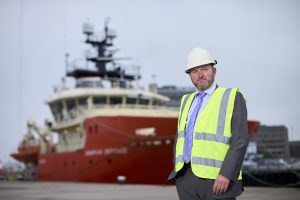North Star, the UK’s largest ship operator servicing the oil and gas industry, has kick-started its fleet decarbonisation plans with an in-depth sustainability study across its 44 offshore infrastructure support vessels.
The study may help North Star enhance operational performance and meet its net-zero by 2040 target.
North Star chief exec Matthew Gordon said: “We are 100% committed to cutting greenhouse gases across our business and accelerating our energy transition.

The firm has commissioned the independent design and engineering consultants, Houlder Ltd, to determine the carbon emission reduction opportunities on its existing fleet and recommend the most effective green innovations for the firm to invest in over the next decade.
As part of the three-stage analysis, Houlder will evaluate North Star’s fleet of emergency response and rescue vehicles, platform supply vessels, as well as its future renewables fleet.
The first will establish greenhouse gas emissions and carbon intensity across its existing assets and onshore operations. It will then identify the most suitable clean technologies to improve each vessel’s efficiency and reduce environmental impact.
The final phase will assess all potential energy-efficient and low emission propulsion solutions that could be retrofitted to the existing fleet.
Alternative fuels of the future will also be considered. The assessment and results are due to be completed in the first quarter of next year.
The firm’s first renewable fleet for the offshore wind market is currently being built. It includes four service offshore vessels (SOVs) and associated daughter craft to support wind turbine technicians working in the North Sea.
Chris Bell, senior consultant at Houlder said: “There are many proven energy efficiency adaptations and technologies that can be deployed today to support the transition to net-zero emissions operations.
There is no single best solution to the decarbonisation challenge. What’s important is to determine how they can best be packaged together for greatest effect.”

